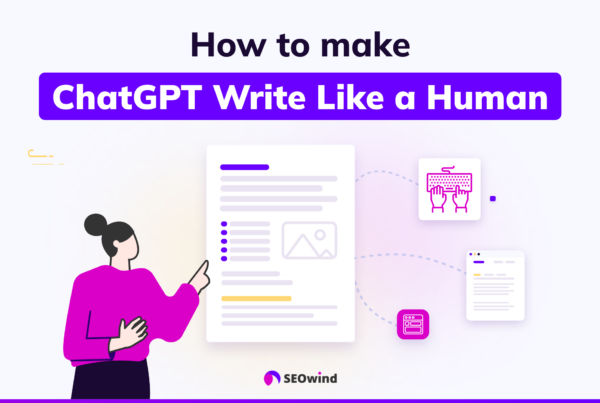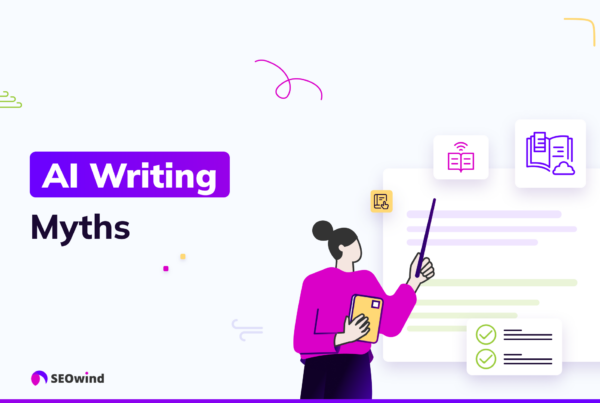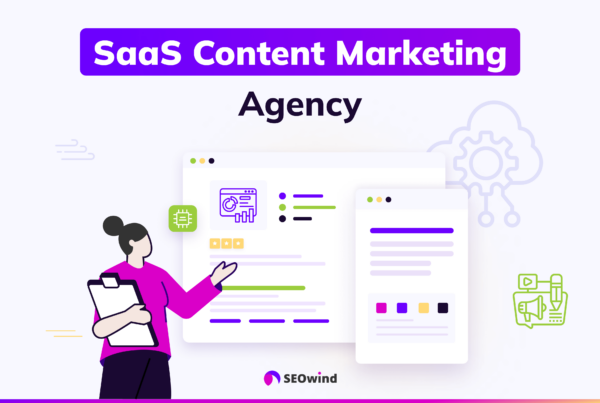Enter Artificial Intelligence (AI), which is stepping onto the stage as a game-changer for SEO and content optimization. Imagine having a personal assistant that meets Google requirements, keeps pace with internet trends without breaking a sweat, and reviews mountains of data to offer clear, real-time insights. This is AI for content optimization.
Introduction to AI for Content Optimization
Definition of Content Optimization
So, what exactly is content optimization? This approach makes your web content more attractive, relevant, and discoverable for users and search engines. It entails matching user intent, strategically placing keywords while ensuring seamless reader engagement, and utilizing multimedia assets effectively.
Importance of optimizing content for better performance
Why should you think about all this? Well, better performance is why! Without finely tuned optimization strategies, we’re merely putting effort into beautiful words and images that fail to reach their intended audience. More optimized content means better visibility on search engines, which translates into higher traffic, leads, and, ultimately, sales. This is like shouting your message from the rooftops rather than whispering amidst bustling crowds.
Introduction to AI and its role in content optimization
But what role does AI play here?
Picture an intelligent roadmap constructed using complex computer processes that utilize past trends to predict future shifts. Now, imagine that the roadmap is specifically tailored for you based on petabytes of data.
That’s AI for content optimization!
This blend of sophisticated algorithms and machine learning models can handle many optimization tasks, from analyzing and forecasting performance to identifying gaps in keyword targeting. This helps you craft a high-performance SEO strategy. Like a master locksmith, it locates the precise keys (keywords, that is!) to unlock the door to success on major search engines. The future no longer belongs solely to human expertise. It’s time to step into a brave new world that blends human creativity with the power of Artificial Intelligence.
How AI Improves Content Optimization
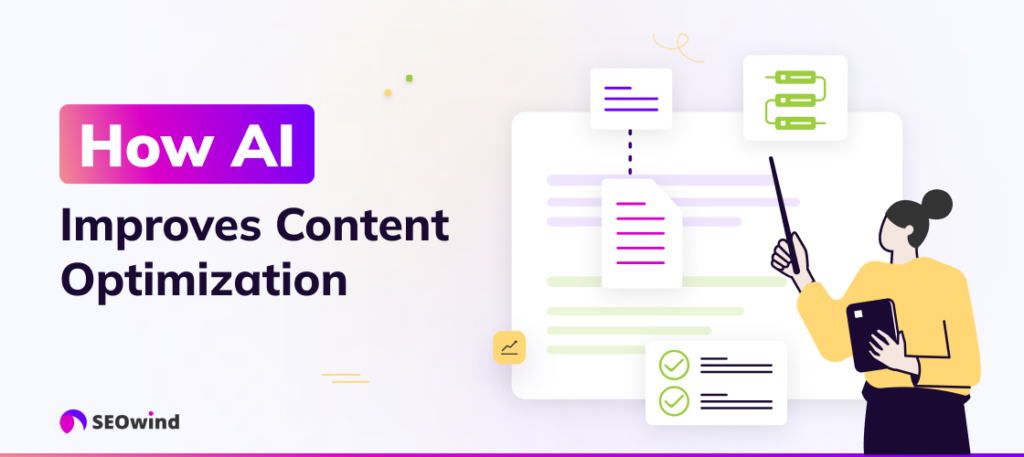
Building a strong, optimized web presence has always been challenging. However, using the power of Artificial Intelligence for content optimization can finally give us a hand with that complex SEO equation. Let’s break down how it all works.
Understanding AI algorithms and machine learning
The first step is understanding some basics about AI, namely algorithms and machine learning.
Behind every piece of AI technology, you’ll find a sequence of operations referred to as an algorithm. These processes can automatically study data patterns, make decisions based on their findings, and consistently refine their approach.
So, how does machine learning come into play? Simply put, machines learn by studying vast quantities of data at lightning speed, making them increasingly efficient in predicting user behaviors or trends over time.
With the ability to instantaneously process copious amounts of data, AI-driven tools can offer unprecedented insights in near real-time for content marketers.
AI’s ability to analyze and interpret data
One significant advantage is how AI analyzes and interprets data, making Sherlock Holmes look amateur! Having processed and learned intact datasets (learning from past interactions), these advanced systems generate insightful findings impossible by human analysis alone.
For instance, consider your website’s bounce rate, which shows if visitors leave after viewing just one page. Now imagine if you could understand the reasons behind these bouncing visitors. Could it be unattractive headings or intrusive ads?
This is where our handy AI assistant steps in!
Predictive capabilities of AI in content optimization
Once an AI system thoroughly scans and analyzes past data, the real magic begins. Prediction. Using complex algorithms, AI can identify what content will resonate best with a particular audience. You’ll feel like you’re gazing into a very detailed crystal ball.
Imagine routinely receiving insights on which topics will likely trend within your industry next month or knowing precisely what longtail keywords could yield better results over the coming weeks.
The predictive abilities extend beyond creation; AI also helps streamline the user experience! For instance, it can determine that certain users prefer video over text or make recommendations for enriching the user journey.
Leading platforms that leverage AI for SEO fully utilize such features to enhance personalized marketing efforts and boost engagement rates.
So, there you have it: the inner workings and impressive possibilities of combining Artificial Intelligence and SEO strategies. Does this mean we’re heading towards entirely automated digital marketing? Well, as valuable as tech can be, it’s still incumbent upon humans to steer the ship correctly. Be ready to aptly use the precious insights provided by AI to gain an irresistible combination that takes content optimization to new heights.
Benefits of Using AI in Content Optimization
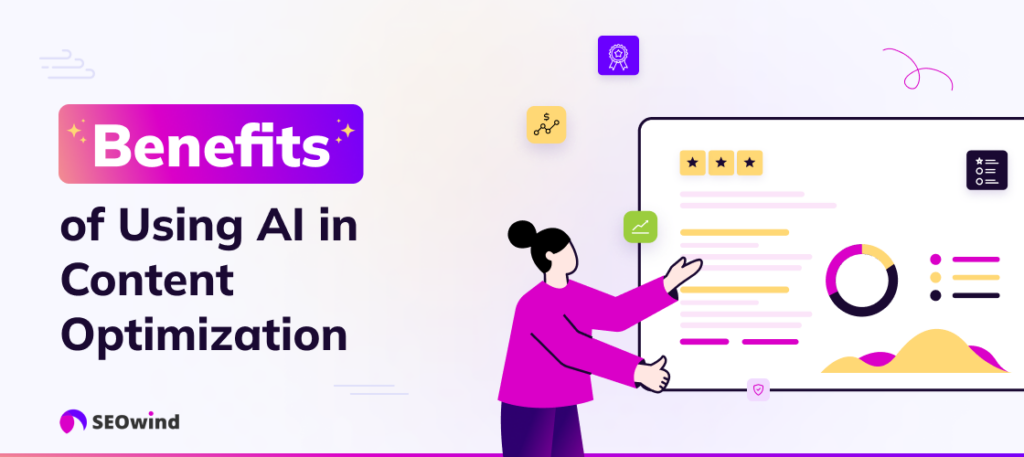
Picture yourself navigating an unknown city without GPS. It would be frustrating, right? That’s what content optimization can feel like without the guiding influence of Artificial Intelligence (AI). In this maze of data and analytics, AI is your compass, leading you to effective strategies and enticing customers to interact with your content.
Let’s explore some of the benefits of using AI for content optimization.
Increased efficiency in keyword research and analysis
In the dynamic landscape of SEO, keywords unlock greater visibility and interaction. Traditional keyword research is often time-consuming. Imagine scanning piles of data manually! But when we let AI handle this task, we redefine efficiency.
These tools use algorithms and machine learning techniques to process vast amounts of information from different sources faster than humans can match. So, while AI takes care of this groundwork, you can switch your focus to strategic planning or other creative pursuits.
Furthermore, the impact extends beyond speed to include identification. AI digs deeper into behavioral data, enabling us to unearth valuable hidden keywords related more closely to user intent than ever. This is a surefire recipe for driving meaningful traffic.
Improved accuracy in creating optimized content
Embracing Artificial Intelligence SEO allows precision like never before.
Consider how difficult it would be to define rules for every nuance in language trends or Google’s subtle algorithm tweaks. Pretty daunting, right? Thankfully, a good AI optimization tool makes such apprehensions history.
The capturing ability of AI SEO stretches beyond mere input-output equations. It diligently analyzes patterns and draws correlations across various data points. These tools refine themselves with each piece of information and deliver considerable, well-tailored results.
This learning-centric evolution only accentuates AI’s accuracy over time, forming a robust foundation upon which we will build our most optimized content.
Better understanding of target audience and user intent
But what if I told you there’s more to this savvy assistant? Automated SEO tools audit more comprehensive data sets within minutes than any manual effort could dream of achieving. In doing so, AI can craft a holistic view of your target audience.
By understanding user intent, you’re essentially reading the minds of your prospective customers. This detailed insight empowers content creation aligned with customer expectations, which leads to more authentic connections and better engagement on your website.
Enhanced personalization and user experience
It facilitates dynamic content display based on browsing history, psychographics, and geographic location. All of this contributes to greater engagement and conversions by enhancing the overall user experience using a tailoring approach. In addition, this approach will leave your audience with long-lasting impressions, effectively ensuring return visits and a high degree of brand loyalty.
However, AI doesn’t just support global optimization. It also supports localization, allowing relatability across varied geographies and cultural conditions. This is a true victory of diversity, underlining unity purpose! And remember, happier visitors are likely to become repeat visitors and potentially loyal customers!
Comparison of Different AI Tools for Optimizing Content
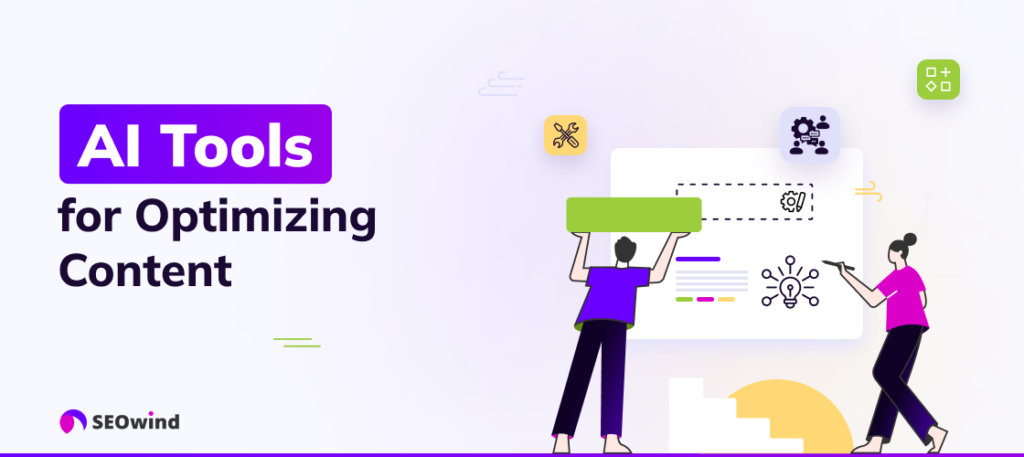
As you navigate the digital landscape, understanding the role of Artificial Intelligence in SEO and content optimization becomes mission-critical. Now, let’s check out the irreplaceable tools that bring AI for content optimization right to your fingertips.
SEOwind: Long-form AI Writer of SEO-optimized articles
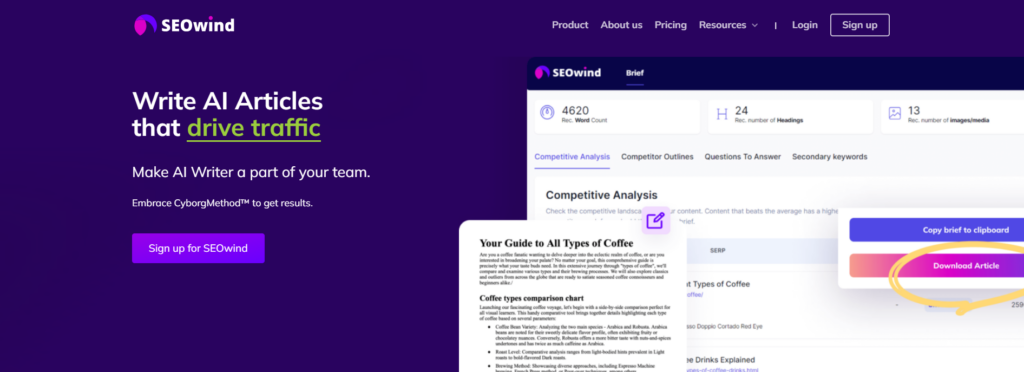
SEOwind is a game-changer in our world of content creation. This AI optimization tool specializes in crafting long-form articles that are strikingly optimized for SEO results. Imbued with an intuitive understanding of your topic, it effortlessly generates content tailored to captivate users and search engines with its keyword-targeting precision. Feed it a keyword and watch how this nifty tool creates masterpieces at breakneck speed.
Utilizing SEOwind elevates efficiency while ensuring your precious time isn’t wasted sifting through excessive revisions. However, don’t forget the human touch! Be ready to tweak and refine the material generated by SEOwind to resonate perfectly with your brand voice.
Semrush: Features, benefits, and limitations
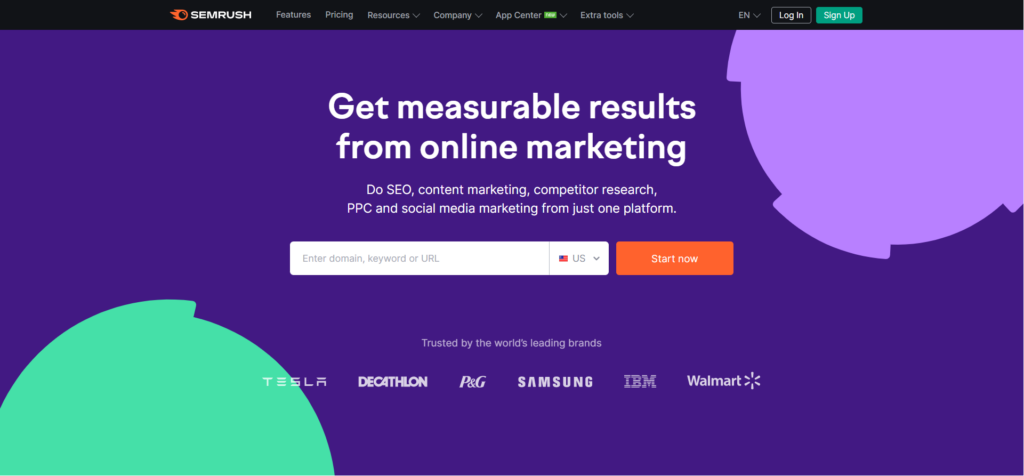
Now, let’s consider Semrush, a popular solution for many businesses operating within the SEO AI field. Adorned with robust features like competitive analysis, backlink tracking, and on-page SEO advice, it smoothly translates complex data patterns to achieve leading SERP positions.
Semrush provides comprehensive insights into website performance across multiple channels. However, nobody’s flawless; handy as it is for gaining a high-level picture of your digital presence, the platform might seem overwhelming to novices due to its extensive range of functionalities.
MarketMuse: Key functionalities and use cases
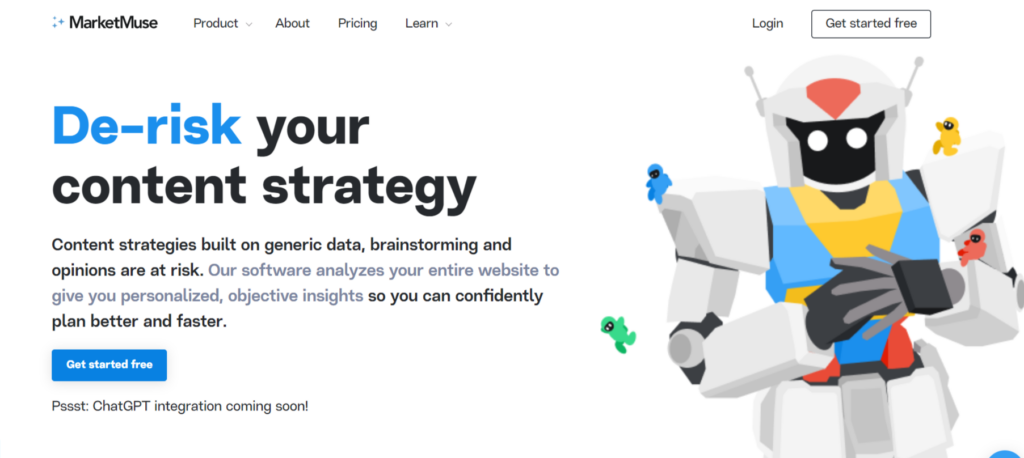
Next on our journey is the MarketMuse! This solution offers big-picture insights alongside granular observations, aiding the delivery of optimized content!
MarketMuse stands out due to its content strategy mapping, which applies predictive metrics that enable users to craft content that truly speaks to target audiences. Though MarketMuse demands an initial learning curve, you’ll get acquainted and soon be leveraging this tool like a champ!
How to Get Started with Using AI for Content Optimization
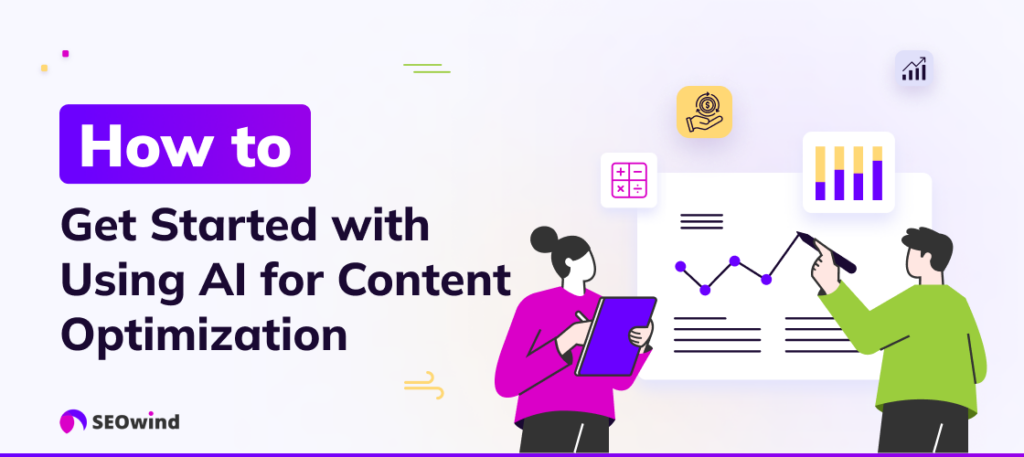
The digital era is here. Leveraging Artificial Intelligence (AI) for content optimization can elevate your business’s SEO game. Just thinking about getting started might seem daunting. However, don’t let this intimidate you; by following these steps, you’ll be harnessing the power of AI in no time.
Evaluating Your Current Content Strategy and Goals
Before plunging into AI-based content optimization, you’ll need to evaluate your present system. Consider:
- Current Performance: Is your existing strategy effective? What are its strengths and weaknesses? The data will not lie. Bounce rates, conversion figures, and time spent on pages should provide clarity.
- Goals Alignment: Check if your current content aligns with your brand’s objectives. Every piece you create must clearly echo what your business stands for.
- Competitive Analysis: Compare your work with that of competitors. Identify their successes and weaknesses, which should shed light on areas in which you need to improve.
Content creation is always a dynamic process where one must mold strategies according to trends and audience preferences. The good news is that revisions such as these are precisely where AI shines.
Finding The Right AI Tool or Platform For Your Needs
Once you’ve finished introspection, it’s time to choose the right tool.
While there are many options, you should pick one tailored to your specific needs rather than chasing hyped-up services. Sometimes, less can indeed be more! That said, a few key considerations must undoubtedly factor into choosing an optimal SEO optimization tool:
- Comprehensive Features: Does the platform offer fully-fledged services under one roof? With services like SEOwind, users can perform content research, keyword exploration, and even monitor content performance with one tool.
- User-Friendly Interface: Easy navigation is paramount. Avoid platforms with cluttered, confusing displays. Opt for software that has an easy-to-use interface.
- Customizability: The AI tool should have customization options to “learn” about your brand’s tone of voice, goals, etc.
Use free trials and view demonstrations to see if the platform ticks all these boxes before making an investment decision.
Training Your Team on Using AI for Content Optimization
Even the best tools are only useful with proper education. With that in mind, ensure your team knows how to use the chosen tool.
Begin by educating them about the reasons behind this transition. Once they understand the benefits, resistance will melt away like butter on a hot pan!
Next comes actual hands-on training. This can take the form of tutorials provided by the software developers or dedicated workshops. Ensure that everyone gets enough time to explore the tool, as practice breeds confidence and leads to effective usage.
Measure the Impact of AI in Your Content Strategy
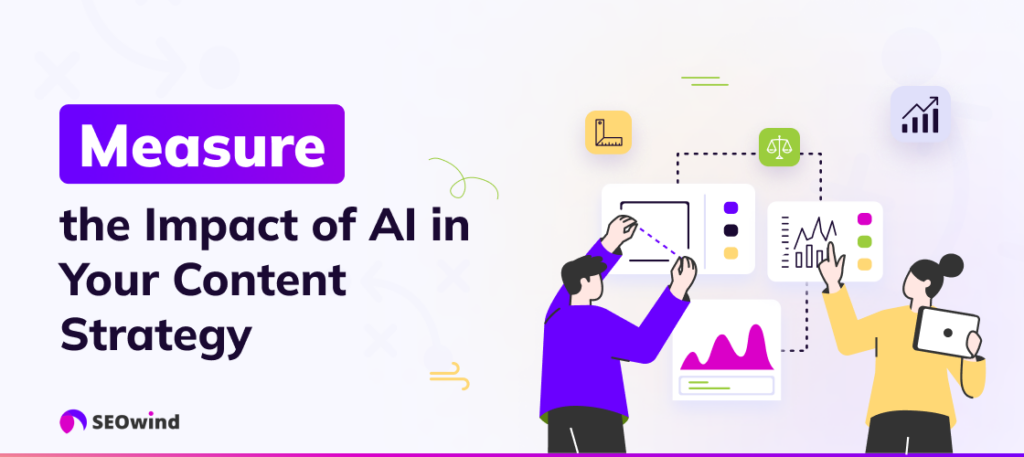
With everything set up, you can roll out your restructured, AI-optimized content strategy. But remember that success comes to those who monitor their progress continuously rather than resting on their laurels.
Perform routine checks to assess whether you’re achieving objectives such as:
- Increased Traffic
- Better engagement rates
- Improved conversion metrics
Are you closer to fulfilling these objectives after implementing AI? If so, congratulations are in order! Otherwise, tweak your strategy until you achieve the desired results.
AI transforming business is hardly breaking news anymore. Companies everywhere are utilizing its capabilities at dizzying speed. But innovative content creators understand that mastering novel tools requires initial effort, while SEO nirvana awaits after those initial growing pains! Once you see the magic of AI unfold in front of your eyes, going back would feel like choosing to walk again after experiencing the joyride that is a superfast sports car!
The Importance of Balancing AI and Human Input in Content Optimization
It’s no secret that advancements like AI for content optimization are revolutionizing the realm of SEO. But let’s not forget the irreplaceable power of human input. In a world deeply engrossed in technology and devices, people are still looking for connection, relatability, and authenticity. This is what makes the engagement strategies effective.
Recognizing the Value of Human Creativity, Intuition, and Expertise
Artificial Intelligence may drive efficiency and standardization in content creation, but creativity remains an inherently human trait. Our unique capability to dream up imaginative concepts cannot be replicated precisely by machines. A warm tone or a witty pun is still characteristic of genuine human writing, which AI optimization tools struggle to imitate perfectly.
Similarly, intuition draws upon our lived experiences and tacit knowledge, an area where Artificial Intelligence SEO is lacking. These deficits indicate gaps only humans can bridge right now.
Moreover, understanding cultural nuances or spotting sensitive topics also requires expertise only seasoned writers can bring to the table. Therefore, maintaining this precarious balance between human input and technological prowess is crucial for optimal output.
Collaboration Between AI Algorithms and Human Editors or Writers
While I advocate for the importance of human input in content creation processes, there’s no denying how, ideally, our skills could harmonize with aids such as SEOwind. AI SEO tools like these help save substantial time on mundane tasks such as keyword research while improving accuracy when implementing technical aspects.
This revolutionary combination allows experienced editors to focus their creative capacities primarily on developing engaging narratives around those SEO strategies rather than getting mired down by technicalities.
Utilizing a Hybrid Approach To Maximize Content Optimization Results – CyborgMethod™
You might be asking whether leveraging Artificial Intelligence and traditional copywriting techniques is taking things too far. Actually, it’s quite the contrary. The perfect combination of power-packed features from AI for SEO tools with the insightful expertise only experienced content creators can contribute.
I believe mastering this CyborgMethod™ is the destiny of next-level content optimization. By combining the precision of AI with the creative genius intrinsic to our human nature, you can deliver outstanding content every time!
While Artificial Intelligence continues to develop, enhancing how we understand and utilize search engine optimization, let’s not overlook our role.
Let’s take a moment to reflect upon what lies ahead. Envisioning future trends in our field helps to map out uncharted ground. While there are many unknowns, here are some potential developments worth considering.
If current advancements indicate anything, the integration between AI and SEO will only continue to deepen. Artificial Intelligence SEO seems destined to become more sophisticated and capable of unprecedented data analysis unheard of today. Imagine an era where your AI-driven tools do not only suggest keywords but also predict shifts in search engine algorithms themselves!
A likely progression of AI optimization could be uber-personalized content. As algorithms become increasingly adept at understanding user intent and behavior patterns, they could generate tailor-made content based on each visitor’s unique preferences and online habits.
Additionally, AI could further refine itself to tackle more complex tasks within content strategy, like emotional analytics. These future AI SEO strategies would understand how certain messages elicit specific emotional responses from different demographics.
Finally, as much as futuristic images remind us of robots replacing humans completely, I foresee an increase in symbiotic orchestration between human minds and machine intellect. We shouldn’t fear being overshadowed by our automated counterparts. Instead, we should make space for their algorithmic precision.
Remember that AI will undoubtedly alter how we optimize content. However, you remain the captain steering this ship through stormy seas to calm shores! Stay resilient when using AI while maintaining your uniquely human touch. This is my final mantra as we map out future trends for AI for content optimization.
